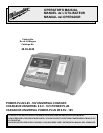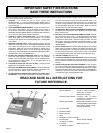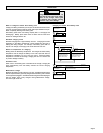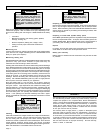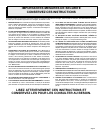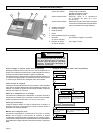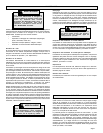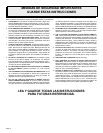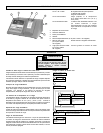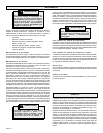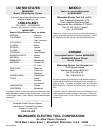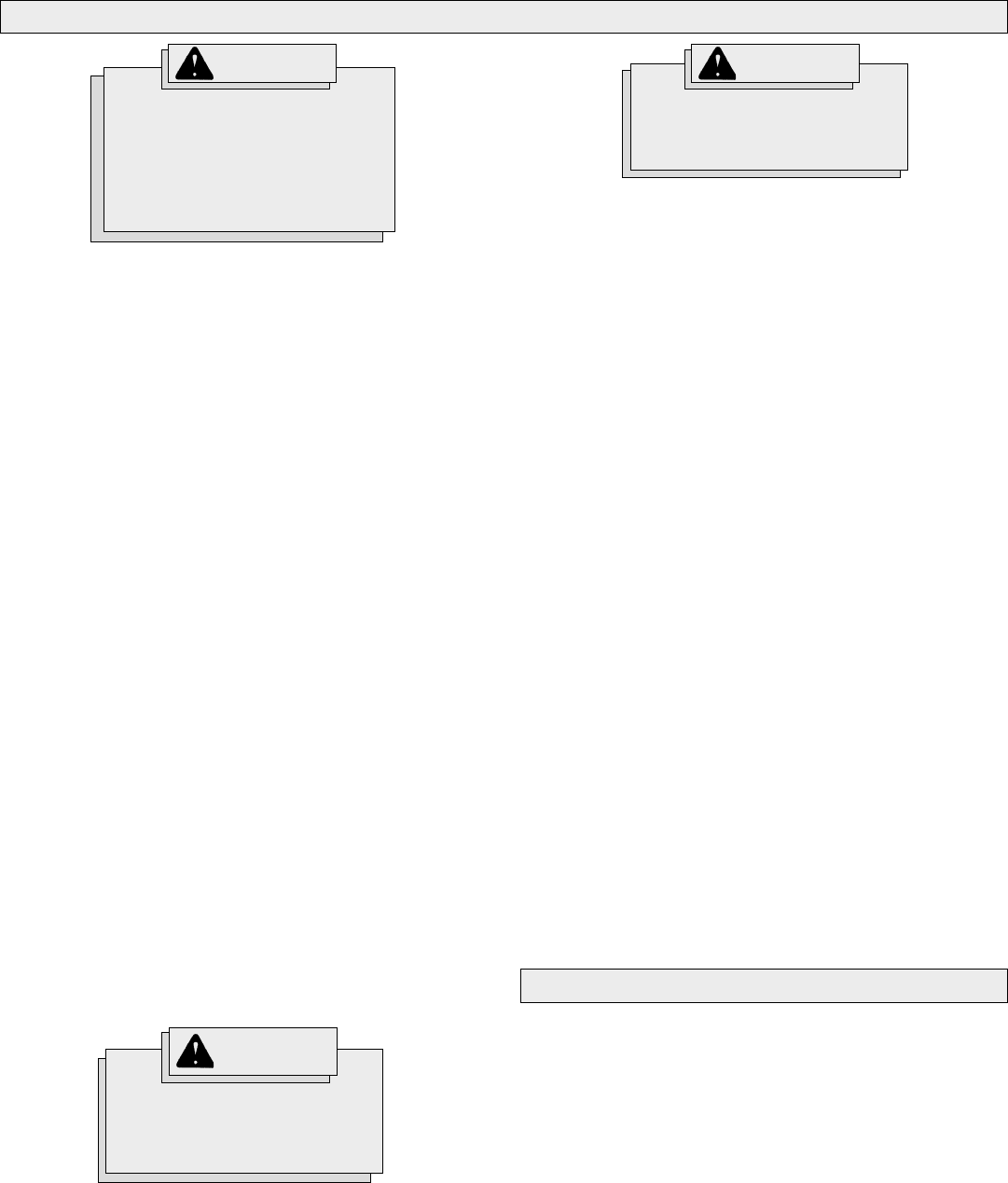
Page 4
Keep your tool, battery pack and charger in good repair by adopting a regular
maintenance program. After six months to one year, depending on use,
return the tool, battery pack and charger to a MILWAUKEE service facility
for:
Lubrication
Mechanical inspection and cleaning (gears, spindles,
bearings, housing, etc.)
Electrical inspection (battery pack, charger, motor)
Testing to assure proper mechanical and electrical
operation
Maintaining tool
If the tool does not start or operate at full power with a fully charged battery
pack, return the tool, charger and battery pack to a MILWAUKEE service
facility for repairs (see Repairs).
Maintaining battery pack
MILWAUKEE Nickel-Cadmium and Nickel-Metal Hydride battery packs will
operate for many years and/or hundreds of cycles when they are
maintained and used according to these instructions.
A battery pack that is stored for six months without being used will discharge
itself. Batteries discharge at a rate of about 1% per day. Charge the battery
every six months even if it is unused to maximize battery life. Do not tape
the tool's trigger in the ON position and leave the tool unattended as this may
discharge the battery to a point where it will no longer be able to recharge.
If the battery pack will not recharge, leave the battery removed from the
charger for 24 hours. This allows the battery pack to recover from deep
discharge. Reinsert the battery pack onto the charger to recharge to full
capacity. Use a MILWAUKEE battery pack only until it no longer performs
with the power and torque needed for your application.
Store your battery pack in a cool, dry place. Do not store it where the
temperature may exceed 120° F (50° C) such as in a vehicle or metal building
during the summer. High temperatures will overheat the battery pack,
reducing battery life. If it is stored for several months, the battery pack will
gradually lose its charge. One to three cycles of charging and discharging
through normal use will restore the capacity of the battery pack. During the
life of the battery pack, the operating time between charges becomes
shorter. If the operating time becomes extremely short after a proper
charge, the usable life of the battery pack has been reached and it should
be replaced.
MAINTENANCE
Disposing of nickel-cadmium battery packs
Nickel-Cadmium battery packs are recyclable. Under various state and local
laws, it may be illegal to dispose of this battery into the municipal waste
stream. Return the battery pack to the nearest MILWAUKEE Branch Office/
Service Center or dispose of your battery pack according to federal, state
and local regulations.
Disposing of nickel-metal hydride battery packs
Nickel-Metal Hydride battery packs are recyclable but may also be disposed
into the municipal waste stream. To recycle, return the battery pack to the
nearest MILWAUKEE Branch Office/Service Center. Always dispose of
your battery pack according to federal, state and local regulations.
Repairs
For repairs, return the tool, battery pack and charger to the nearest service
center listed on the back cover of this operator's manual.
Battery pack warranty
Battery packs for cordless tools are warranted for one year from the date
of purchase.
WARRANTY
Every MILWAUKEE tool is thoroughly inspected and tested before leaving
our manufacturing facilities. Should any trouble develop, return the
complete tool prepaid to our Corporate Office, Branch Office/Service
Center or nearest Authorized MILWAUKEE Service Station. If inspection
shows the trouble is caused by defective workmanship or material, all
repairs will be made without charge, and the tool will be returned,
transportation prepaid. Battery packs for cordless tools are warranted
for one year from the date of purchase.
This warranty does not apply where: (1) repairs or attempted repairs
have been made by persons other than MILWAUKEE personnel or
Authorized Service Station personnel; (2) repairs are required because
of normal wear; (3) the tool has been abused or involved in an accident;
(4) misuse is evident, such as caused by overloading the tool beyond its
rated capacity; (5) the tool has been used after partial failure or (6) the
tool has been used with an improper accessory. No other warranty,
written or verbal, is authorized.
Cleaning
Clean dust and debris from charger and tool vents. Keep tool handles clean,
dry and free of oil or grease. Use only mild soap and a damp cloth to clean
the tool, battery pack and charger since certain cleaning agents and
solvents are harmful to plastics and other insulated parts. Some of these
include gasoline, turpentine, lacquer thinner, paint thinner, chlorinated
cleaning solvents, ammonia and household detergents containing ammonia.
Never use flammable or combustible solvents around tools.
WARNING!
To reduce the risk of explosion,
never burn a battery pack even if
it is damaged, dead or completely
discharged.
To reduce the risk of injury, always
unplug the charger and remove the
battery pack from the charger or tool
before performing any mainte-
nance. Never disassemble the tool,
battery pack or charger. Contact a
MILWAUKEE service facility for ALL
repairs.
WARNING!
To reduce the risk of injury and
damage, never immerse your
tool, battery pack or charger in
liquid or allow a liquid to flow in-
side them.
WARNING!



